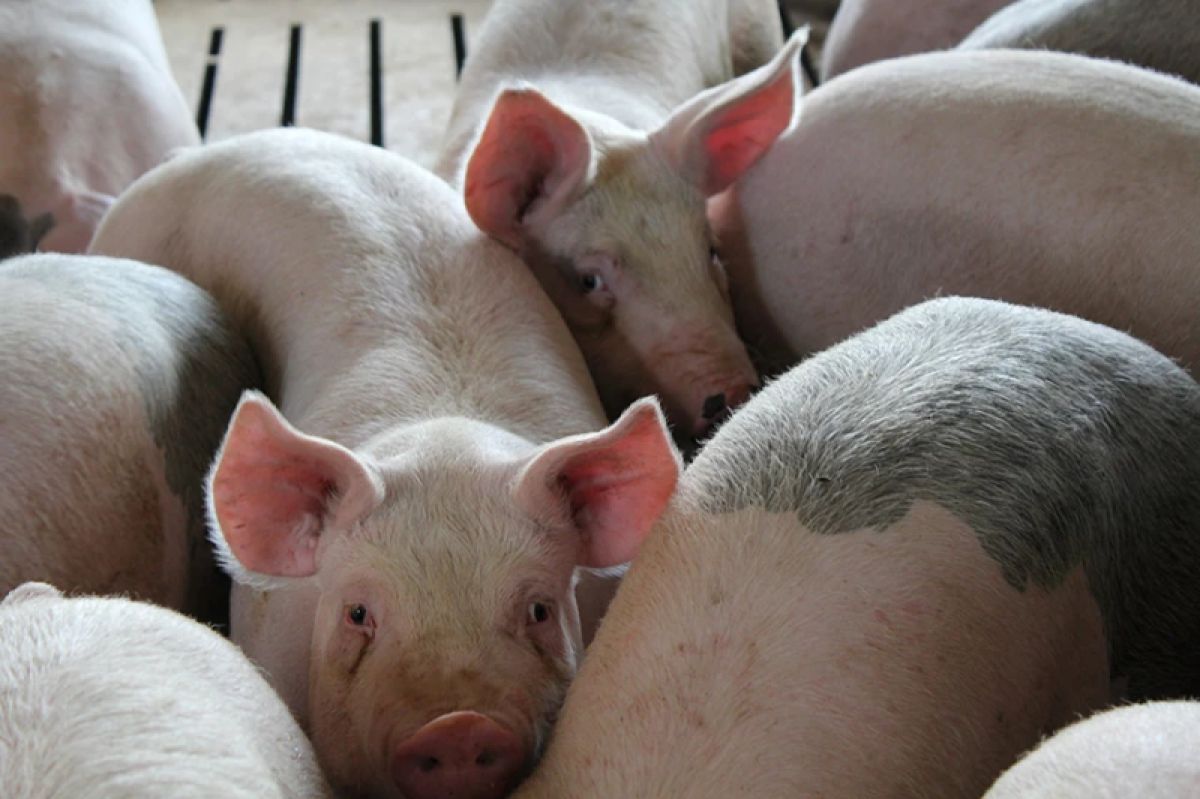
The Missouri Supreme Court decided state laws prohibiting local CAFO regulations are not unconstitutional. (File: Amy Mayer / Harvest Public Media)
A state law prohibiting counties from imposing regulations on industrial hog facilities does not violate the Missouri Constitution, the Missouri Supreme Court ruled Tuesday.
The unanimous ruling upholds a Cole County Circuit Court judge’s decision to toss the case before trial. It says county ordinances attempting to set rules for industrial farms are invalid.
At issue is Missouri’s policing of concentrated animal feeding operations, or CAFOs, which are industrial facilities capable of raising thousands of hogs, cows or chickens at a time.
Despite complaints from rural neighbors, the state’s policies toward the industrial farms have become friendlier in recent years. In 2019, the Missouri General Assembly passed a bill prohibiting county CAFO rules that are “inconsistent with or more stringent than” state law or regulation.
Two years later, they tightened it even further. County ordinances now can’t be “inconsistent with, in addition to, different from, or more stringent” than state rules.
In effect, it prohibits counties from imposing any policy over CAFOs.
CAFOs are commonly bemoaned by rural neighbors who complain about the smell and worry that the massive amount of manure produced by the animals — which can number in the hundreds of thousands for hogs — could pollute groundwater.
Improper maintenance at CAFOs can spell disaster.
Two years ago, a CAFO owned by Smithfield Foods, one of the world’s largest pork producers, spilled an estimated 350,000 gallons of hog manure and wastewaterwhen an employee failed to close a valve and drained the wastewater lagoon.
The spell polluted between 12 and 15 miles of nearby creeks and tributaries. It turned the water nearly black and contaminated it with up to 30 times the level of ammonia safe for wildlife.
Smithfield was fined $18,000 for the spill.
Concerns about environmental and health harms led several counties to impose restrictions on CAFOs, including requiring them to be setback from neighboring homes and imposing air and water quality requirements.
Twenty Missouri counties imposed some sort of restrictions on CAFOs before the state restricted local regulation, according to a map created by the University of Missouri Extension.
Stephen Jeffery, an environmental attorney, represented the plaintiffs in the case, which included two counties that had imposed CAFO ordinances, a nonprofit called Friends of Responsible Agriculture Inc., and rural neighbors of a proposed facility. The group appealed the 2021 circuit court decision against them.
He argued that the 2019 and 2021 state laws violated the “Right to Farm” amendment of the Missouri Constitution, which grants authority to counties to regulate agriculture.
But the Supreme Court opinion, written by Chief Justice Paul Wilson, said the appellants failed to prove the 2019 and 2021 state laws violate the Right to Farm amendment.
“It cannot be said that the amended section…violates the Right-to-Farm Amendment by conflicting with the counties’ article VI powers because those powers are only as broad or as narrow as the General Assembly wants them to be,” Wilson wrote.
Jeffery also argued that the 2021 law was unconstitutional because it was so broad. The CAFO language was amended onto a bill that also dealt with school districts, police boards, county courts and sewer districts.
The bill wound up being described as “relating to local government.”
The Supreme Court rejected that argument too. The question, Wilson wrote, is not whether the title is broad.
“It plainly is,” Wilson wrote.
He went on: “Rather, the question is whether this title is so broad that it fails to provide clear notice to legislators or interested citizens as to the bill’s contents. It is not.”
Wilson wrote the bill is “sufficiently clear” to give a legislator or citizen interested in tracking CAFO legislation notice “that they may want to examine its contents and track its progress.”
At the very least, Jeffery argued last year, the 2019 and 2021 state laws shouldn’t apply to counties with existing CAFO ordinances. He said it should only prohibit new ones.
The Supreme Court rejected that, saying any ordinance in conflict with the two state laws “is void from and after the effective date of the 2021 amendment regardless of when the ordinance was adopted.”
This story was originally published on the Missouri Independent.













